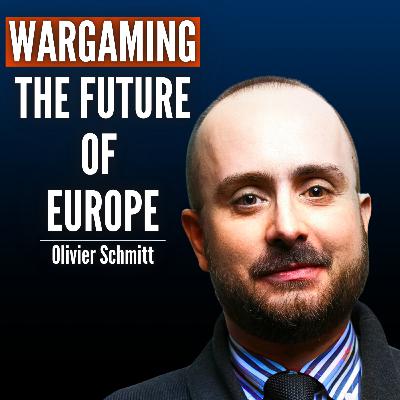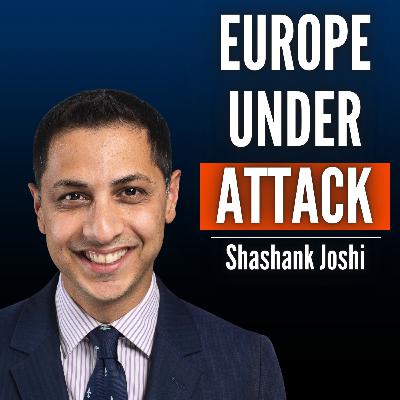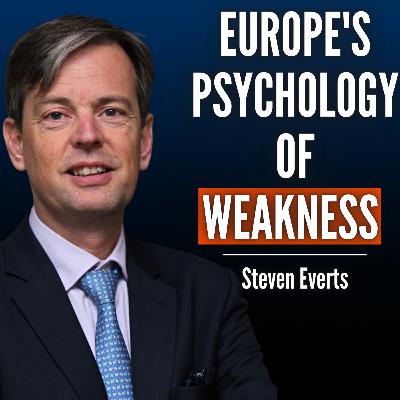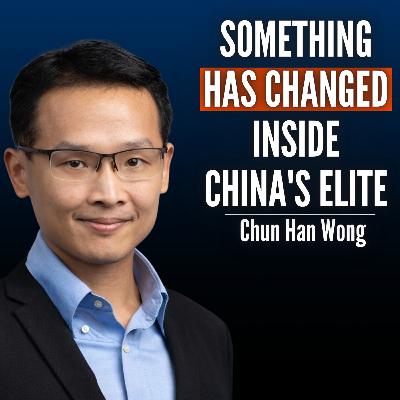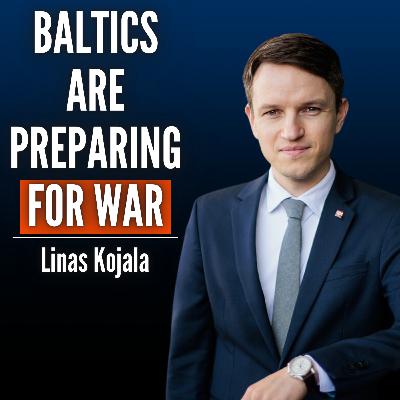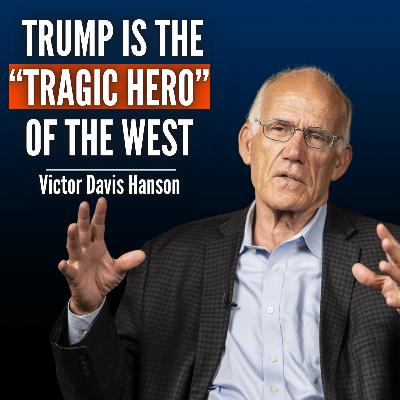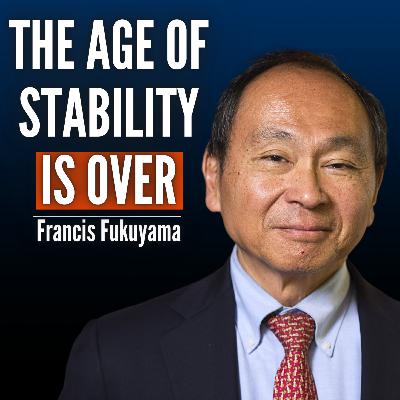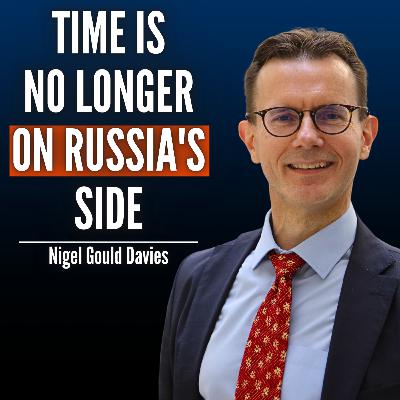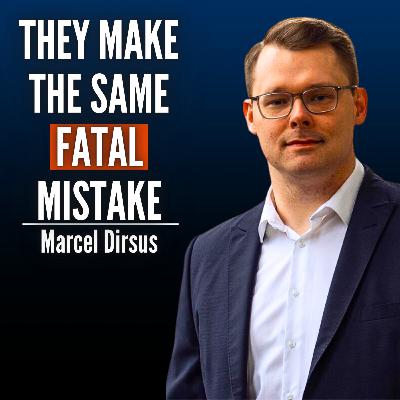Discover Decoding Geopolitics Podcast with Dominik Presl
Decoding Geopolitics Podcast with Dominik Presl

Decoding Geopolitics Podcast with Dominik Presl
Author: Decoding Geopolitics
Subscribed: 162Played: 4,943Subscribe
Share
© Decoding Geopolitics
Description
Decoding Geopolitics is a podcast that tries to make sense of today's dangerous world by talking with real experts on international relations, strategy and security.
121 Episodes
Reverse
➡️ Watch the full interview ad-free, join a community of geopolitics enthusiasts and gain access to exclusive content on PATREON: https://www.patreon.com/DecodingGeopolitics➡️ Sign up to my free geopolitics newsletter: https://stationzero.substack.com/This is a conversation with James D Lindsay, a Research Fellow at University College London and an author of a book on what’s called a Madman theory - a foreign policy strategy in which a leader attempts to present himself as completely irrational and willing to inflict great damage on themselves and the others in order to improve their negotiating position and create fear around possible escalation - even if in reality, they are actually a lot more restrained and not as mad as it may seem. The pioneer of this theory was Richord Nixon but the person who is often speculated to truly master the theory is Donald Trump - although there is a big debate over whether he is playing a madman to get what he wants - or whether that’s just really who he is.With James we talk about how Nixon tried and failed to use this strategy and pioneering this approach but we mostly focus on Donald Trump - about his first term and threatening North Korea with fire and fury, assassinating the Iranian general Qaseem Soleimani and threatening to leave NATO and his second term and his tariff war and attempt for Greenland takeover.To be honest, I don’t actually agree with most of James’s conclusions. I’m not nearly as sure that Donald Trump is just playing a madman and that it’s all part of a rational, negotiating tactic as he is - I can think it could just as well be a genuine chaos and irrationality. And even if it is a rational strategy, I really don’t think that it has been nearly as successful as James argues, especially in Trump’s second term. And that - whether it is a rational strategy or not - it causes more damage to US interests than it helps them. And so in the podcast, we disagree and argue about both of those things. But nevertheless, I do think that the theory and the concept, the arguments and this whole conversation is really interesting.
➡️ Watch the full interview ad-free, join a community of geopolitics enthusiasts and gain access to exclusive content on PATREON: https://www.patreon.com/DecodingGeopolitics➡️ Sign up to my free geopolitics newsletter: https://stationzero.substack.com/This is a conversation with Dalibor Rohac - a senior fellow at the American Enterprise Institute, a long-time observer of European and transatlantic politics, and someone who is living intellectually and professionally between the United States and Europe. He’s originally from Europe, specifically Slovakia but he has worked in Washington for well over a decade - and so he has a unique view into a relationship in which the two sides are increasingly failing to understand each other.We recorded this a few days after the Munich Security Conference, where this year the crisis in transatlantic relations became by far the most dominant topic even as we have the war in Ukraine still going on right here in Europe. And so we talk about what did the conference tell us about where we are - what was the point of Marco Rubio’s speech and his visit to Hungary right after, why did Europeans give him a standing ovation and whether Europe now believes that everything is fine again - or to what extent does it actually even matter what the US Secretary of State says in an administration where everything is decided by Donald Trump anyway. And we take a step back and talk about the bigger picture as well - whether Donald Trump is more a historical aberration and in 2028 everything will go back to normal or whether he is the start of a bigger systemic change in America - and why this question is fundamentally important to Europe and the rest of the democratic world. About whether the US is now trying to dismantle the European Union and how Europe should react or about the fundamental contradictions at the center of US foreign policy - and much more.
➡️ Watch the full interview ad-free, join a community of geopolitics enthusiasts and gain access to exclusive content on PATREON: https://www.patreon.com/DecodingGeopolitics➡️ Sign up to my free geopolitics newsletter: https://stationzero.substack.com/This is a conversation with John Foreman - someone with a fairly unique background to talk to on the Russian war in Ukraine. John spent several decades as an officer in the British military but more importantly he served as the British defence attache first in Kyiv and then in Moscow where he witnessed Russia first preparing and then launching the war in 2022 up close - both of which gives him a unique insight into both the Ukrainian and Russian military, political strategic thinking - and in this conversation we talk about all of that.We talk about what have the four years of war actually done to the Russian military. Is it broken? Is it adapting? Is it hollowed out and beaten down by the years of war - or is it battle hardened with unique combat experience and more dangerous than before?And then we move to the underlying question of where is this war going: whether the current Ukraine negotiations are actually leading anywhere or are they are simply diplomatic theater, what is the fundamental flaw at the center of Trump’s approach to the negotiations, and whether Moscow is - with increasing casualties and economic pressure - starting to actually look for a deal or whether it’s just pretending and dragging out the negotiations indefinitely.
➡️ Watch the full interview ad-free, join a community of geopolitics enthusiasts and gain access to exclusive content on PATREON: https://www.patreon.com/DecodingGeopolitics➡️ Sign up to my free geopolitics newsletter: https://stationzero.substack.com/This is a conversation with Max Bergmann, the director of the Europe, Russia, and Eurasia Program at the Washington-based Center for Strategic and International Studies and an excellent analyst of transatlantic relations and European security - both of which are undergoing some pretty fundamental shifts. We talk about Greenland and why Trump’s attempt to annex it will be remembered as the beginning of a historic rift between Europe and the United States, why do MAGA Republicans seem to have so much vitriol against Europe and insult and berate it at every opportunity they have, about what should be Europe’s takeaway from this whole episode or about if after all this has happened, does NATO now only exist on paper - and if in practice, it isn't already dead. And about the concrete things that Europe needs to do to get ready to defend itself without the U.S. - and about the historic and completely transformational shift in European security and politics that’s still largely ignored - but that is now already happening.
➡️ Watch the full interview ad-free, join a community of geopolitics enthusiasts and gain access to exclusive content on PATREON: https://www.patreon.com/DecodingGeopolitics➡️ Sign up to my free geopolitics newsletter: https://stationzero.substack.com/This is a conversation with Dr. Yun Sun, a Senior Fellow and Director of the China Program at the Stimson Center. Yun is one of the most experienced China watchers and researchers, analyzing China’s foreign and domestic politics for over two decades which makes this conversation and her arguments both extremely interesting and kind of concerning. Because Yun argues that we are gravely under-estimating the risk of a Chinese invasion of Taiwan - not in some distant future but as soon as this year, 2026. She believes that the thinking in Beijing among China’s leadership is quickly changing: that they are abandoning the idea that time is on their side and that instead, China now believes that if it ever wants to get Taiwan, it’s now or never and the longer it waits, the harder it will get. And that we are now witnessing a confluence of several dynamics - none of which were likely or expected - but that are now all happening at the same time. And that together they are - as Yun Sun puts it - creating a “perfect storm for Taiwan in 2026” - and significantly increasing the odds that China might make its move. In this conversation, we talk about what these factors are - from the US foreign policy and China’s perception of Donald Trump to the Ukraine war - how likely a Chinese invasion this year is or what the recent purges of the leadership of the Chinese military - and the fact that Xi Jinping now has direct, unlimited command of China’s armed forces - mean in this context.
➡️ Watch the full interview ad-free, join a community of geopolitics enthusiasts and gain access to exclusive content on PATREON: https://www.patreon.com/DecodingGeopolitics➡️ Sign up to my free geopolitics newsletter: https://stationzero.substack.com/This is a conversation with Andrew Monaghan, a longtime Russia analyst and one of the most interesting – and contrarian – voices in the Western debate about Russian strategy and power.A lot of Andrew’s recent work focuses on a simple but uncomfortable idea: that the West fundamentally misunderstands Russia - not because we lack information, but because we keep using the wrong lenses. We tend to see Russia as irrational, tactical, reactive, or simply blundering its way through events – especially since the invasion of Ukraine. Andrew argues something quite different. That Russia is strategic, that it has a long-term view of where it’s going, and that many of the things that look like chaos or incompetence make a lot more sense once you look at how Russian strategy is actually conceived and implemented.In this conversation, we talk about whether Russia really has a grand strategy, what that strategy is trying to achieve, and how the war in Ukraine fits into it – or doesn’t. We get into Russian geoeconomic thinking, mobilization, maritime power, and why focusing only on battlefield performance might be misleading when thinking about where Russia is heading over the next decade. Throughout the conversation, we push back on each other a lot and I'd say that even now I still disagree with much of what he says. But I find his perspective that challenges a lot of deeply held assumptions in Western analysis really interesting - and definitely worth a listen.
➡️ Watch the full interview ad-free, join a community of geopolitics enthusiasts and gain access to exclusive content on PATREON: https://www.patreon.com/DecodingGeopolitics➡️ Sign up to my free geopolitics newsletter: https://stationzero.substack.com/This is a conversation with Carlo Masala, a professor of international politics at the Bundeswehr University Munich and author of a book that got quite a lot of attention all across Europe called “If Russia Wins”. In the book Carlo portrays a hypothetical scenario - in which Russia ends up achieving a limited victory in Ukraine, pursues a period of normalization with Europe and a few years later, launches a limited attack on Estonia, in an attempt to break up NATO unity - which - in the scenario - turns out to be a success. Carlo is not the first person to present a scenario in which Russia tests NATO but what makes this different and unique is how exceptionally realistic this one is. From the start to finish, I could genuinely see most of it happening - and in many instances, I thought the scenario was not just plausible but the most likely way things would happen - which makes it all the more frightening and worth consideration. In the conversation, we pick it apart, explore how it would play out and what would it mean. We talk about whether Russia would have an appetite for another military gamble after Ukraine, whether the Estonians would just let it happen, whether Europe has learned its lesson on how to deal with Russia in the past 4 years, what would not wanting to risk a World War 3 over a small town in Estonia mean for NATO and European security - or whether there is any hope that an American president would come to aid of Europe at a time when Trump is literally demanding Greenland. And whether - effectively - NATO just isn't already dead anyway - and if it is, what does that mean for all of us.
➡️ Watch the full interview ad-free, join a community of geopolitics enthusiasts and gain access to exclusive content on PATREON: https://www.patreon.com/DecodingGeopolitics➡️ Sign up to my free geopolitics newsletter: https://stationzero.substack.com/This is a conversation with Rory Cormac, a professor at the University of Nottingham who’s professional is on a very particular subject - how states engage in and deploy “covert action” - subversive actions against their opponents carried out in secrecy with that the state itself denying its own involvement. Or in other words, the shadiest stuff that spies from nations all around the world do - from overthrowing foreign governments, arming proxy groups and carrying out sabotage and assassinations.If you are interested in geopolitics, this probably naturally comes as a fascinating subject - and so we talk about how various nations approach and engage in this area - from the U.S. effort to overthrow Maduro’s regime in Venezuela and its rich history of overthrowing foreign regimes, Russian wave of covert action in Europe and what European countries like the UK and France covertly do or not do themselves, how does China approach this and why does it seem to stay under the radar - or why if covert action is meant to be secret, we seem to read about all the time in mainstream news - and much more.
➡️ Watch the full interview ad-free, join a community of geopolitics enthusiasts and gain access to exclusive content on PATREON: https://www.patreon.com/DecodingGeopolitics➡️ Sign up to my free geopolitics newsletter: https://stationzero.substack.com/This is a conversation with Andrias Kubilius - the European Union’s Commissioner for Defense and Space. For those not that familiar with the European Union - a commissioner is kind of like a minister in a nation state, a top politician, responsible for a particular area. Historically the EU has never had a Defence Commissioner because it is not a military organization but since the invasion of Ukraine that has changed quite radically and in 2023, Andrias became the first ever EU Defense commissioner, responsible primarily for rebuilding the European defense industry, rearming Europe and making it ready and able to defend itself. Needles to say, it’s a pretty important role and as the European Union is trying to act more as an independent geopolitical actor, it’s only becoming more important. And for how important his role is, he was extremely open and transparent in this conversation. We talked about how to make Europe prepared to survive in an increasingly dangerous world and defend itself on its own, without anyone coming to save it. Both about what is he doing to make that happen but also how the European Union needs to change to make it possible , including why he believes that we need a true European army. We talk a lot about the complicated relationship with the United States - about why and how Europe needs to immediately prepare for United States withdrawing from Europe, about what will be the future of NATO once that happens and whether the EU could replace it, and how would Europe respond if the United States decide to take Greenland by force and how destructive that would be for everyone. And about his views on the new US National Security Strategy - which he is very critical of and which frames the very institution he represents - the European Union - as an opposition to the interests of the United States and something that the US should try to dismantle. And of course we talk about Russia - about how likely is the threat of a Russian aggression against EU and NATO or how prepared Europe is right now to face it. And much more.
➡️ Watch the full interview ad-free, join a community of geopolitics enthusiasts and gain access to exclusive content on PATREON: https://www.patreon.com/DecodingGeopolitics➡️ Sign up to my free geopolitics newsletter: https://stationzero.substack.comThis is a conversation with Olivier Schmidt, head of research at the Institute for Military Operations at the Royal Danish Defence College and expert on military strategy. As you might have noticed, especially if you listen to this podcast, Europe is not having the easiest time when it comes to geopolitics - it’s trying to support in its Ukraine with Russia, rebuild its militaries after decades of hibernation, deal with increasingly unpredictable and sometimes openly hostile United States, all while trying to understand and adapt to the entirely new geopolitical reality we find ourselves in. And from the European perspective, understanding where are we going and how to best adapt to it is both really important and really difficult. And that’s why I’m speaking with Olivier today. He recently wrote an academic paper that basically lays out the 4 different scenarios that Europe might experience in the coming years - based on how hostile the United States will get and how united Europe manages to stay. It’s an extremely interesting and helpful approach that moves away from abstract anxieties and towards tangible realistic scenarios that help us understand what’s ahead and how to prepare for it. In this conversation we talk about all of them as well as what each of them would mean and what would be the best course of action in each of the four different futures we might find ourselves in.
➡️ Watch the full interview ad-free, join a community of geopolitics enthusiasts and gain access to exclusive content on PATREON: https://www.patreon.com/DecodingGeopolitics➡️ Sign up to my free geopolitics newsletter: https://stationzero.substack.com/This is a conversation with Andrew Badger - a former human intelligence officer at the DIA - the United States Defense Intelligence Agency, a lecturer at Oxford University, an advisor on geopolitics for some of the world’s largest corporations, and an author of an upcoming book on what I think is mostly overlooked but an extremely interesting topic - of how China in the past decades managed to mobilize its vast intelligence apparatus, its citizens living abroad, its private companies and basically everything it has at its disposal to covertly obtain some of the most advanced technology belonging to American companies. And how this technology helped China to massively develop its economy, its private companies and its military in an extremely short timespan and basically catch up to the United States in a way that otherwise might not have been possible. We talk about how China actually does that on a practical level and why is it so good at it, even though it’s not at all the country doing that or how is the intelligence competition shaping the race for AI dominance and much more.
➡️ Watch the full interview ad-free, join a community of geopolitics enthusiasts and gain access to exclusive content on PATREON: https://www.patreon.com/DecodingGeopolitics➡️ Sign up to my free geopolitics newsletter: https://stationzero.substack.com/This is a conversation with Shashank Joshi, the chief Defence Editor at the Economist and one of the best geopolitical and defence analysts out there. We discuss one thing in this conversation - the new United States National Security Strategy - that was publicly announced in December 2025, that is in many ways completely unprecedented and that has triggered an immense wave of attention, backlash and worry among U.S. allies as well much more positive reaction from U.S. adversaries like Russia. We talk about why that is - what is actually included in the strategy and what makes it such a big departure from the previous decades of US foreign policy and why it is such a big deal. How to read it between the lines in not just what it says but how it says it or what it doesn't say - and what it tells us about the foreign policy priorities of this US administration. About why this document is bad news for Europe and why it should genuinely be concerned or about the reports that there is another version of this document - a not public one - that is significantly worse for Europe and why it might not be just rumours. What it means for the rest of the world - for China, Taiwan, Asia, Latin America, Middle East and what this document tells us about what the next years will look like - and much more.
➡️ Watch the full interview ad-free, join a community of geopolitics enthusiasts and gain access to exclusive content on PATREON: https://www.patreon.com/DecodingGeopolitics➡️ Sign up to my free geopolitics newsletter: https://stationzero.substack.com/This is a conversation with Steven Everts, a former EU diplomat and the director of the EU Institute for Security Studies. Steven recently wrote a really interesting article that went sort of viral in European policy circles where he argued that at the heart of Europe's geopolitical problems is what he calls its "Psychology of Weakness” and called out what he says is the failing strategy of European leaders. I thought it was really interesting since it managed to cut to the core of the chaos, uncertainty and anxiety that dominates Europe these days as we find ourselves stuck between pressure from Donald Trump’s America and Putin’s Russia. But since it only touched on many things that deserved more more attention, I wanted to have a proper discussion about it.And so we talk about all of it: about what is Europe’s Psychology of Weakness and why it’s putting Europe in such an uncomfortable spot. About why there is often a big difference between what European leaders say and what they actually do. About what is Europe going to do with the frozen Russian assets, how it should and could stand up to the US or what could change the failing strategy and psychology it has today.
➡️ Watch the full interview ad-free, join a community of geopolitics enthusiasts and gain access to exclusive content on PATREON: https://www.patreon.com/DecodingGeopolitics➡️ Sign up to my free geopolitics newsletter: https://stationzero.substack.com/This is a conversation with Chun Han Wong, a reporter at the Wall Street Journal, author of the book Party of One covering how Xi Jinping transformed China and its political system and an expert on China’s internal insider politics. Few people understand what actually goes on inside China’s politics better than him - how decisions and policies are made and what drives those who make them. We talk about what does Xi and other people in the communist party leadership actually believe in, what do they want, what are their deepest fears and what do they really want to achieve. About how China changed by Xi dismantling the collective decision making system, about whether China has a grand strategy to become the number one superpower or whether it’s just improvising, how Beijing thinks about confrontation with the United States or what the purges in the Chinese military reveal about its confidence and preparedness to take military action - and much more.
➡️ Watch the full interview ad-free, join a community of geopolitics enthusiasts and gain access to exclusive content on PATREON: https://www.patreon.com/DecodingGeopolitics➡️ Sign up to my free geopolitics newsletter: https://stationzero.substack.com/This is a conversation with Linas Kojala - the director of the Geopolitics and Security Studies Center - and an associate professor of international relations at Vilnius University. Linas is from Lithuania and an expert on Baltic security among other things - and so this is what we talk about. About what have the past 4 years looked like from the perspective of NATO’s frontline states - three countries with small populations that are often spoken about as the primary and most likely target for any potential Russian escalation towards NATO. How much more real does that threat feel here compared to Western Europe, how have they spent the 4 years since the war in Ukraine began to prepare and how prepared are they today. How do they view the possible departure of United States from Europe and why Germany is starting to become an alternative security provider in the region instead - and much more.
➡️ Watch the full interview ad-free, join a community of geopolitics enthusiasts and gain access to exclusive content on PATREON: https://www.patreon.com/DecodingGeopolitics➡️ Sign up to my free geopolitics newsletter: https://stationzero.substack.com/This is a conversation with Gabrielus Landsbergis. Gabrielus is a visiting fellow at the Stanford University’s Institute for International Studies and former minister of foreign affairs of Lithuania - a role that he held between 2020 and 2024. Like many of his Baltic colleagues he held and holds a very hawkish view on Russia, on supporting Ukraine and on European defense and security.But what makes him unique is that he’s also extremely openly critical of European leadership on all these issues - criticizing what he calls Europe’s appeasement of Trump, weak lack of support for Ukraine and indecisiveness in facing Russia - all the while he has personal first-hand experience with the same leadership he’s criticizing. He has been in many of the rooms where the decisions and policies were made and he knows the leaders taking them. And so we discuss the ongoing negotiations over the U.S. 28 point peace plan proposal, the European response to it, what’s going to come out of it and what Europe should be doing instead. And we also talk about Europe’s geopolitical strategy or the lack thereof in general - why does Europe seem to be stuck in a strategic impotence unable to take the lead or responsibility for itself, whether it’s starting to change or how it should be dealing with America led by Donald Trump and much more.
➡️ Watch the full interview ad-free, join a community of geopolitics enthusiasts and gain access to exclusive content on PATREON: https://www.patreon.com/DecodingGeopolitics➡️ Sign up to my free geopolitics newsletter: https://stationzero.substack.com/This is a conversation with Victor Davis Hanson - a classics professor, military historian, a Senior Fellow at the Stanford’s University Hoover Institution and one of the most prominent advocates and supporters of Donald Trump, especially within the academic think-tank world. If you’ve listened to this podcast before, you probably noticed that I am pretty critical of Donald Trump’s foreign policy. While I don’t reject everything he does, I have some pretty fundamental issues with how he treats Europe, NATO or America’s allies and its international commitments in general. And you also might have noticed that many of my guests are very critical of Donald Trump’s foreign policy as well - just in recent months I spoke with John Bolton, Anne Applebaum, Francis Fukuyama all of whom have been even more critical than me. However, I don't want to close myself off in my own bubble, and I think it’s good to be open to ideas of people with other views, especially if they argue in good faith and if we agree on some basic values.And that’s why I'm speaking with Victor today. He is a pretty staunch Trump supporter but he also has many views that are not typically associated with Trump - he strongly supports NATO, he is a major supporter of Ukraine, he is hawkish on Russia and advocates for the U.S. to arm and he is overall the type that most Donald Trump supporters might call a “neoconservative” with views that Donald Trump himself has frequently criticized.And so we speak about how all those things go together. How does protecting the postwar-liberal order go together with Trump talking about annexing Greenland and Canada, why didn't Trump end the war in 24 hours as he promised or whether he was naive in his plan for how to do that, how can Europe be in an alliance with a U.S. president who doesn't believe in alliances or why he thinks that Trump is the most pro-European U.S. president in history.To clarify, I don't agree with many of the views that Victor has talked about on European or Americans domestic politics but that’s not what the podcast is about and I didn't want to focus on. And I’m still not sure whether I agree with anything that he said - but despite that, I think that it’s a fascinating conversation that I was really glad to have. And I heard a perspective that might not be the same as mine but that I still found to be really interesting - I hope you’ll feel the same way.
➡️ Watch the full interview ad-free, join a community of geopolitics enthusiasts and gain access to exclusive content on PATREON: https://www.patreon.com/DecodingGeopolitics➡️ Sign up to my free geopolitics newsletter: https://stationzero.substack.com/This is a conversation with Francis Fukuyama, a professor and research fellow at Stanford and one of the most famous and influential scholars of political science and international relations of our time. Although he has decades of scholarship behind him, he is by far most well known for one book, titled the “End of History and the Last Man” which is both highly influential and highly misunderstood and in which he argued that following the fall of the Soviet Union in the early 90s, humanity has reached the final stage of human government in the form of liberal democracy. We talk about what the argument of the book actually was, why it is so often misunderstood, and why the End of History did not happen. About why history seems to have taken a turn backwards and why we are witnessing democratic backsliding and return of large scale wars and conflicts, why democracies everywhere seem to be going through major crises and how to fix that, or what - if the history is not ending - is ahead of us now. And what still gives him hope that liberal democracy is not going anywhere just yet.
➡️ Watch the full interview ad-free, join a community of geopolitics enthusiasts and gain access to exclusive content on PATREON: https://www.patreon.com/DecodingGeopolitics➡️ Sign up to my free geopolitics newsletter: https://stationzero.substack.com/You can access Nigel's analysis at: https://www.iiss.org/online-analysis/online-analysis/2025/10/the-russiaukraine-war-has-entered-a-new-phase/This is a conversation with Nigel Gould Davies - a senior research fellow at the International Institute for Strategic Studies and an expert on Russian politics and strategy. He’s also a former British diplomat who worked in Russian and served as UK’s ambassador to Belarus. And he’s also a brilliant analyst and recently wrote a very interesting piece in which he basically argued for two main things. First, that because of several crucial factors that have quite dramatically changed over the recent months, the Russian strategic position and calculus has now changed as well - since Russia, according to him, no longer has time on its side and it’s becoming aware of this. And second that as a result, Russia will inevitably become much more aggressive and confrontational and it will escalate its actions both in Ukraine and in Europe. It’s a really and though-provoking analysis and this was a chance into a lot more detail about what is happening and what it might lead to.
➡️ Watch the full interview ad-free, join a community of geopolitics enthusiasts and gain access to exclusive content on PATREON: https://www.patreon.com/DecodingGeopolitics➡️ Sign up to my free geopolitics newsletter: https://stationzero.substack.com/This is a conversation with Marcel Dirsus, a political scientist whose research focuses on the fascinating topic of “survivability of dictatorships” - figuring out how and why some autocratic regimes fall while others survive and remain stable for generations. It’s a fascinating topic, and the discussion is roughly split into three parts. First, we talk the theory: What factors make some regimes weak and fragile, while others are strong and stable? How do regimes typically fall? What follows next after that happens? Or what are the key warning signs that things are about to go downhill? Second, we talk about the history and we apply the theory on the case of the downfall of communist regimes in Eastern Europe. And finally, we talk about the present, and we use Marceau’s theory to stress test how stable or fragile, or several of the key autocratic regimes of the world today.











